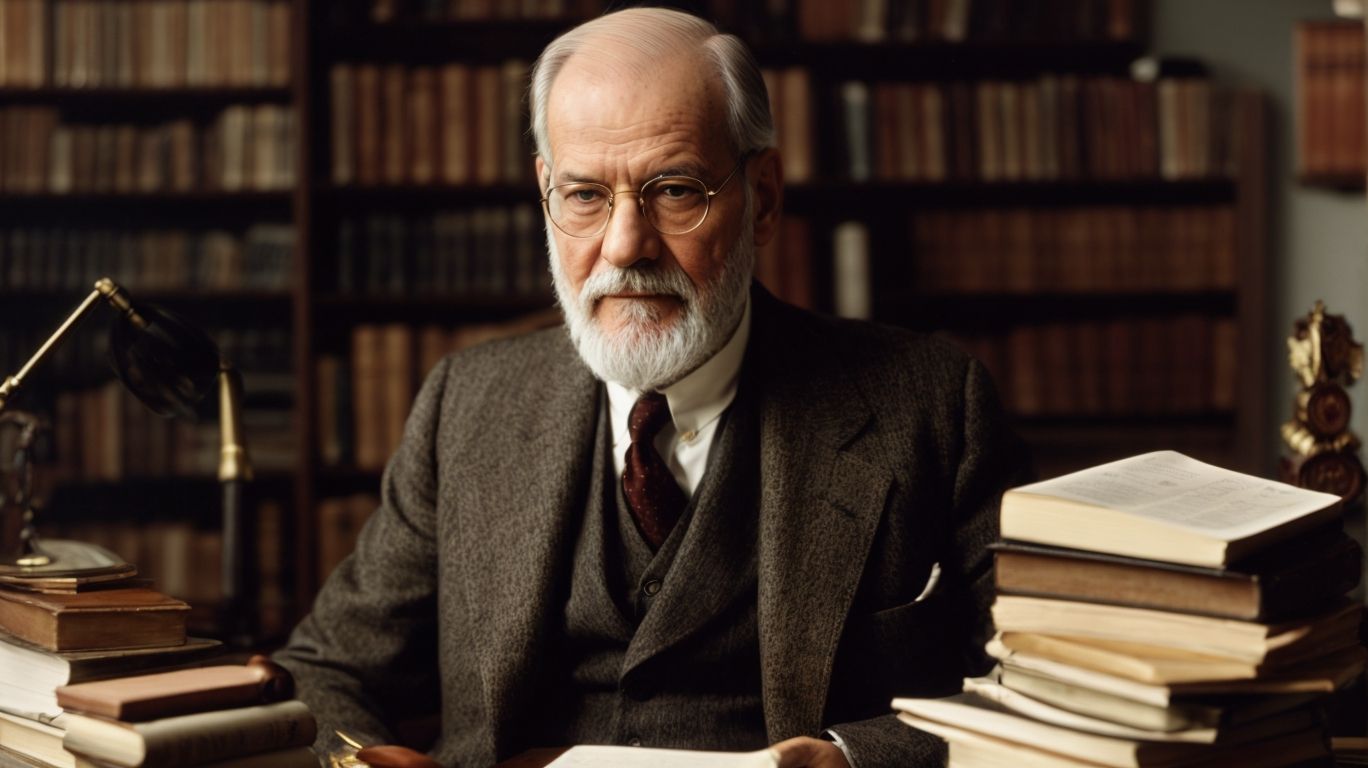Have you ever wondered about the origins of the Psychoanalytic School of Psychology? In this article, we will uncover the founder of this fascinating branch of psychology and explore its main principles and key concepts. From the unconscious mind to psychosexual stages, we will delve into the unique aspects that set the Psychoanalytic School apart from other psychological schools.
Join us as we journey through the techniques used in Psychoanalytic therapy and discuss the criticisms surrounding this influential approach.
Contents
- 1 Who is the Founder of Psychoanalytic School of Psychology?
- 2 What is Psychoanalytic School of Psychology?
- 3 What are the Main Principles of Psychoanalytic School of Psychology?
- 4 What are the Key Concepts of Psychoanalytic School of Psychology?
- 5 What are the Techniques Used in Psychoanalytic Therapy?
- 6 What are the Criticisms of Psychoanalytic School of Psychology?
- 7 Frequently Asked Questions
- 7.1 Who is the founder of the Psychoanalytic School of Psychology?
- 7.2 When was the Psychoanalytic School of Psychology founded?
- 7.3 What is the main focus of the Psychoanalytic School of Psychology?
- 7.4 What are the key principles of the Psychoanalytic School of Psychology?
- 7.5 How did Sigmund Freud develop the Psychoanalytic School of Psychology?
- 7.6 How has the Psychoanalytic School of Psychology influenced modern psychology?
Who is the Founder of Psychoanalytic School of Psychology?
Sigmund Freud, the renowned Austrian psychologist, is widely regarded as the founder of the Psychoanalytic School of Psychology.
Freud’s groundbreaking theories revolutionized the understanding of human behavior and mental processes. His emphasis on the unconscious mind, dreams, and the role of early childhood experiences in shaping personality paved the way for a new approach to psychological inquiry.
Freud’s development of psychoanalysis as a method of treating mental disorders and exploring the complexities of the human psyche marked a significant shift in the field of psychology. By looking into the unconscious motivations of individuals, Freud aimed to uncover hidden conflicts and desires that influenced behavior.
What is Psychoanalytic School of Psychology?
The Psychoanalytic School of Psychology, founded by Sigmund Freud, delves into the intricate realms of the human mind, exploring unconscious motivations and behaviors through the lens of psychoanalysis.
This school of thought emphasizes the significant influence of early childhood experiences on adult personalities and behaviors. Psychoanalysis posits that many unresolved conflicts from childhood manifest in adulthood, shaping individuals’ thoughts, emotions, and behaviors. Freud’s development of concepts such as the id, ego, and superego laid the foundation for understanding the complex interplay between conscious and unconscious processes in shaping human behavior and psychological disorders.
How is Psychoanalytic School of Psychology Different from Other Schools?
The Psychoanalytic School of Psychology, pioneered by Sigmund Freud, stands apart from other psychological schools due to its emphasis on exploring the unconscious mind, interpreting dreams, and analyzing the impact of childhood experiences on adult behaviors.
One of the key unique aspects of the Psychoanalytic School is its belief that unconscious thoughts and desires greatly influence our conscious thoughts and behaviors. Freud delved deeply into the notion that hidden motivations and conflicts shape our actions, often without our awareness. This perspective challenges more behaviorist or cognitive paradigms that focus primarily on observable behaviors and conscious thought processes.
Freud’s emphasis on dream analysis set psychoanalysis apart by suggesting that dreams are windows into our unconscious desires and conflicts. By interpreting the symbolic content of dreams, psychoanalysts seek to uncover repressed emotions and unresolved issues that impact an individual’s waking life.
The Psychoanalytic School places a significant emphasis on childhood experiences and how they shape adult personalities and behaviors. Freud’s theory of psychosexual stages, for example, posits that early childhood experiences can greatly influence an individual’s psychological development and personality traits.
What are the Main Principles of Psychoanalytic School of Psychology?
The Psychoanalytic School of Psychology, rooted in the teachings of Sigmund Freud, is underpinned by several fundamental principles that delve into the complexities of the human psyche and behaviors.
One of the central tenets of psychoanalytic theory is the concept of the unconscious mind, where repressed thoughts, desires, and memories influence our conscious thoughts and actions without our awareness. Freud believed that exploring these unconscious motivations through techniques like free association and dream analysis could lead to a better understanding of an individual’s behavior.
Childhood experiences play a crucial role in shaping an individual’s personality and emotional development according to psychoanalytic principles. Freud emphasized the significance of early relationships with caregivers in forming one’s sense of self and relational patterns.
Defense mechanisms are another key component of psychoanalytic theory, representing the unconscious strategies individuals use to protect themselves from anxiety and distress. Examples include repression, projection, and denial.
Freud’s theory of psychosexual stages also holds a prominent place in psychoanalytic thought, proposing that individuals pass through distinct developmental stages in early life that significantly impact their psychological and emotional well-being in adulthood.
Unconscious Mind
At the heart of the Psychoanalytic School of Psychology lies the concept of the unconscious mind, a realm where primal instincts, such as the libido and death drive, shape human thoughts, emotions, and behaviors.
In Freudian theory, the libido represents the driving force behind pleasure-seeking impulses and life-sustaining behaviors, while the death drive, also known as Thanatos, encompasses destructive and self-destructive tendencies.
These unconscious forces operate beneath the surface of awareness, influencing dreams, slips of the tongue, and even seemingly irrational behaviors that manifest in everyday life.
Through psychoanalysis, individuals can delve into these hidden layers of the mind, uncovering repressed memories and desires that impact their conscious experiences and relationships.
Childhood Experiences
Psychoanalytic theory posits that childhood experiences, including the Oedipus complex, play a pivotal role in shaping adult personality traits and relational patterns, as elucidated by Sigmund Freud.
Freud believed that the Oedipus complex, which occurs during the phallic stage of psychosexual development, involves a child’s unconscious desire for the opposite-sex parent and rivalry with the same-sex parent. This unresolved conflict can lead to internalized emotional struggles, impacting future relationships and behavior patterns.
Early interactions with caregivers, known as attachment figures, heavily influence individuals’ sense of trust, autonomy, and intimacy in adulthood. These formative experiences during the oral, anal, and phallic stages lay the groundwork for the development of an individual’s psyche and overall psychological functioning.
Defense Mechanisms
Freudian psychoanalysis delves into the intricate web of defense mechanisms, protective strategies employed by the psyche to manage anxiety, conflicts, and unwanted impulses, as proposed by Sigmund Freud.
One key aspect of defense mechanisms is their unconscious nature, operating beneath the surface of conscious awareness. These mechanisms serve as shields, shielding individuals from distressing thoughts or emotions that could overwhelm them. Freud categorized defense mechanisms into various types, from repression to projection, each serving a unique purpose in safeguarding the individual’s mental equilibrium.
For example, repression blocks painful memories from consciousness, while projection attributes one’s undesirable qualities onto others, reducing internal conflict. Understanding these mechanisms provides insight into how individuals navigate the complex landscape of their minds, striving to maintain psychological balance.
Psychosexual Stages
Sigmund Freud’s Psychoanalytic School of Psychology introduces the notion of psychosexual stages, developmental phases where the individual’s libido energy focuses on different erogenous zones, shaping personality and behavior.
Freud’s theory outlines five stages:
- Oral: The oral stage centers around the mouth and sucking, influencing dependencies in adulthood.
- Anal: Emphasis is on control and order due to toilet training.
- Phallic: Characterized by Oedipus and Electra complexes, dictating gender identity.
- Latent: A time of suppressed sexuality.
- Genital: The final stage where mature sexual interests and relationships develop.
What are the Key Concepts of Psychoanalytic School of Psychology?
The Psychoanalytic School of Psychology introduces key concepts such as the id, ego, and superego, intricate components of the psyche that interact to regulate human thoughts, desires, and behaviors, as proposed by Sigmund Freud.
Freud’s structural model divided the mind into the id, responsible for primal instincts and desires, the ego, serving as the rational mediator between the id and superego, and the superego, embodying societal norms and values.
This dynamic interaction between the id, ego, and superego forms the basis of personality development and shapes an individual’s responses to the external world, impacting emotional expression, decision-making, and overall psychological well-being.
Id, Ego, and Superego
The tripartite structure of the psyche, consisting of the id, ego, and superego, forms the cornerstone of Freudian psychoanalysis, delineating the dynamic interplay between primal instincts, rationality, and moral conscience.
According to Freud, the id represents the unconscious and impulsive part of the mind, driven by the pleasure principle, seeking gratification and immediate satisfaction without considering consequences. In contrast, the ego operates on the reality principle, mediating between the demands of the id and the external world, striving to find practical and realistic ways to meet desires.
The superego, Freud’s term for the moral component, embodies societal norms, values, and internalized parental authority, acting as the conscience and enforcing standards of right and wrong. The interplay among these three elements shapes human behavior, influencing decision-making processes and regulating internal conflicts.
Transference and Countertransference
The concepts of transference and countertransference in psychoanalytic therapy reflect the complex relational dynamics between therapist and client, shedding light on unconscious projections and emotional reactions, as outlined by Sigmund Freud.
Transference occurs when the client redirects feelings and desires from past relationships onto the therapist, often revealing deep-seated issues and unresolved conflicts. This phenomenon allows the therapist to gain insight into the client’s inner world and explore underlying motivations.
On the other hand, countertransference pertains to the therapist’s emotional responses triggered by the client, indicating their own unresolved issues and biases. Freud emphasized the importance of recognizing and managing these dynamics to maintain a balanced therapeutic relationship and prevent personal influences from interfering with the client’s progress.
Repression and Sublimation
Repression and sublimation, defense mechanisms elucidated by Sigmund Freud, reveal the intricate ways in which the psyche manages unacceptable impulses by either banishing them to the unconscious or channeling them into socially acceptable activities.
Freud’s theory suggests that repression involves pushing disturbing thoughts, memories, or desires into the unconscious mind, where they continue to influence behavior without conscious awareness. On the other hand, sublimation allows individuals to redirect these urges into productive outlets, such as art, sports, or intellectual pursuits, serving as a healthier way to deal with inner conflicts.
By understanding how repression and sublimation function, individuals gain insight into their own coping mechanisms and behavioral patterns, shedding light on the complex interplay between conscious and unconscious elements of the mind.
What are the Techniques Used in Psychoanalytic Therapy?
Psychoanalytic therapy employs various techniques, such as free association, to uncover unconscious conflicts, desires, and emotions, as pioneered by Sigmund Freud in the realm of psychoanalysis.
In free association, the patient is encouraged to speak freely, without censorship, allowing thoughts, memories, and feelings to surface spontaneously. This technique aims to delve into deeper layers of the psyche, shining a light on repressed material that influences behavior and emotions. By navigating these unconscious aspects, individuals can gain insight into their inner conflicts and inner dynamics, fostering self-awareness and personal growth. Through this introspective process, patients can unravel long-held patterns, navigate emotional hurdles, and ultimately work towards resolving unresolved issues.
Free Association
Free association, a foundational technique in psychoanalytic therapy developed by Sigmund Freud, encourages patients to express thoughts and feelings without censorship, unveiling hidden aspects of the unconscious mind.
This technique is based on the principle that the mind’s true desires and conflicts can be revealed through the spontaneous flow of thoughts, bypassing conscious barriers. By allowing the mind to wander freely, patients can tap into buried memories, traumas, and emotions that may have been shielded from awareness. Through this process, free association acts as a tool for therapists to help individuals explore their innermost thoughts and gain insight into their behavior patterns and motivations, ultimately leading to self-discovery and personal growth.
The Founder of Psychoanalytic School of Psychology Revealed
Dream Analysis
Dream analysis, a pivotal aspect of psychoanalytic therapy spearheaded by Sigmund Freud, unravels the symbolic language of dreams to unveil unconscious desires, fears, and unresolved conflicts.
Freud posited that dreams serve as a royal road to the unconscious, offering a glimpse into the inner workings of the mind. Through dream analysis, therapists interpret hidden symbols and manifestations to explore the deepest layers of an individual’s psyche. These symbols, according to Freud, represent repressed thoughts and emotions that often elude conscious awareness. By looking into the meaning behind dreams, patients can gain insight into their unresolved issues, past traumas, and unfulfilled wishes. This method of introspection and interpretation allows for a deep understanding of one’s psychological landscape.
Analysis of Resistance
The analysis of resistance in psychoanalytic therapy, as elucidated by Sigmund Freud, delves into the barriers and defenses that inhibit therapeutic progress, shedding light on underlying conflicts and unresolved issues.
Resistance, in Freudian psychoanalysis, serves as a key mechanism for the patient to protect themselves from uncovering painful or uncomfortable truths about their unconscious mind. By identifying and analyzing these resistances, therapists can navigate through the intricacies of the patient’s psyche, unraveling deep-seated fears and traumas that lie beneath the surface. It allows for a deeper understanding of the root causes of emotional distress and behavioral patterns, paving the way for effective treatment strategies and lasting transformation.
What are the Criticisms of Psychoanalytic School of Psychology?
While influential, the Psychoanalytic School of Psychology has faced criticism for its lack of empirical evidence, focus on unconscious processes, and the perceived length and cost of psychoanalytic therapy, as articulated by Sigmund Freud’s critics.
Detractors of the Psychoanalytic School find fault in its reliance on unobservable and unverifiable unconscious factors, which they argue undermines its scientific credibility. The subjective nature of interpreting symbols and dreams within the Freudian framework raises concerns about the lack of replicability and objectivity in psychoanalytic practice.
Critics highlight the extended duration and expense associated with psychoanalytic therapy, questioning the feasibility for individuals seeking more immediate and cost-effective treatments. This has led to debates on the accessibility and practicality of Freudian therapy methods in modern mental health contexts.
Lack of Scientific Evidence
Critics of the Psychoanalytic School of Psychology, including detractors within the Austrian Empire, question the validity of Freud’s theories due to the perceived lack of empirical evidence supporting psychoanalytic concepts.
The criticisms primarily revolve around the challenge of tangibly proving abstract concepts like the unconscious mind and psychosexual development, which are foundational to Freud’s psychoanalytic framework. The subjective nature of these concepts poses a significant barrier to empirical validation, as they are not easily quantifiable or observable in traditional scientific methodologies. Critics argue that Freud’s theories heavily rely on introspection and retrospective interpretation, which are deemed as inherently subjective and open to bias.
Focus on Unconscious and Childhood Experiences
Detractors of the Psychoanalytic School of Psychology, including critics like Martha Bernays, raise concerns about the singular emphasis on unconscious processes and childhood experiences in Freudian theory, suggesting an oversimplification of human behavior.
These detractors argue that focusing solely on unconscious motivations and early life events may overlook the complexities of adult personality development. While Freud’s theories have been foundational in the field of psychology, many contemporary critics stress the need for a more holistic approach that considers the influence of social, cultural, and environmental factors on human behavior.
Long-Term and Expensive Therapy
Critics of the Psychoanalytic School of Psychology, echoing sentiments from the University of Vienna, critique the extended duration and high costs associated with psychoanalytic therapy, positing accessibility and affordability challenges for patients.
Detractors in academic and clinical circles express concerns that the prolonged nature of psychoanalytic therapy may not be suitable for individuals seeking more immediate relief.
The financial aspect of Freudian psychoanalysis is also under scrutiny, with critics highlighting how the expenses involved can deter people from embarking on such long-term treatments.
Academic discussions delve into the effectiveness of psychoanalytic therapy compared to shorter, more cost-effective alternatives, questioning whether the benefits justify the time and monetary investment.
Frequently Asked Questions
Who is the founder of the Psychoanalytic School of Psychology?
The founder of the Psychoanalytic School of Psychology is Sigmund Freud, an Austrian neurologist and the father of psychoanalysis.
When was the Psychoanalytic School of Psychology founded?
The Psychoanalytic School of Psychology was founded in the late 19th century, around 1896 to be exact.
What is the main focus of the Psychoanalytic School of Psychology?
The main focus of the Psychoanalytic School of Psychology is the study of the unconscious mind and its influence on behavior and mental processes.
What are the key principles of the Psychoanalytic School of Psychology?
The key principles of the Psychoanalytic School of Psychology include the existence of the unconscious mind, the importance of childhood experiences, and the influence of the id, ego, and superego on behavior.
How did Sigmund Freud develop the Psychoanalytic School of Psychology?
Sigmund Freud developed the Psychoanalytic School of Psychology through his clinical work with patients, his self-analysis, and his theories on sexuality, dreams, and the human psyche.
How has the Psychoanalytic School of Psychology influenced modern psychology?
The Psychoanalytic School of Psychology has influenced modern psychology in various ways, such as the importance of the unconscious mind, the focus on early childhood experiences, and the use of psychoanalytic techniques in therapy. However, it has also been heavily criticized and integrated with other approaches to create a more holistic view of human behavior.





